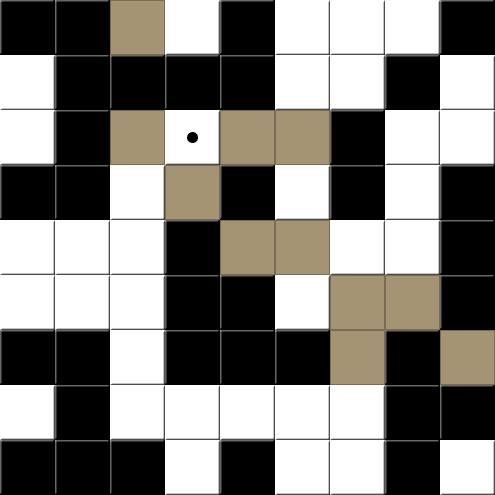|
Advertisement
|
Kaomi

DescriptionKaomi is a territory game for two players: Black and White. It is played on the spaces (squares) of an initially empty square board. The recommended board sizes are between 5x5 and 9x9. Each player must have access to a sufficient number of stones of their own color. DefinitionsIn these rules, "adjacent" always means "orthogonally adjacent". A group is a stone along with all other like-colored stones one could reach from it through a series of steps between adjacent stones of its color. The size of a group is the number of stones in it. PlayBlack plays first, then turns alternate. On your turn, place a stone of your color on an empty square and move all stones adjacent to it one square directly away from it. If a stone is moved to an occupied square, the stone that was originally on that square is moved one square in the same direction as the stone that landed on it, and so on. If a stone lands outside the board, said stone is moved to the farthest square in the opposite direction, next to the edge of the board. If this square is already occupied, the stone on that square is moved one square directly toward your newly placed stone, and so on. If two stones are moved to the same previously empty square, the one of those two stones that moved toward or past your newly placed stone is returned to its original square. If this square contains another stone that was moved on the same turn, said stone is also returned to its original square, and so on. Your newly placed stone cannot be moved. Any stone landing on it is returned to its original square, along with all other stones that were moved in the same or the opposite direction as that stone. The game ends when the board is full. Then, the players jointly remove pairs of opposite-colored groups of the same size from the board until there are no more such pairs to remove. The player with the biggest group left over wins. If the board is empty, whoever added the last stone to the board loses. Pie ruleThe pie rule is used in order to make the game fair. This means White will have the option, on their first turn only, to swap sides with their opponent instead of making a regular move. VariantsSquared: A player's score is the sum of the squares of the sizes of their groups. The player with the higher score in the final position wins. Komi is used instead of the pie rule. Komi is the even number of points which is added to White's score at the end of the game as a compensation for playing second. Before the game starts, the first player chooses the value of komi, and then the second player chooses sides. Alternatively, experienced players may agree on a standard value for all games. —description from the designer Game DiscussionsAdd CommentYou need to be logged in to comment. Insert Bullet List Please enter at least one item. Item: Item: Item: Item: Item: Insert Numeric List Please enter at least one item. Item: Item: Item: Item: Item: Insert Link Please enter the link of the website Optionally you can add display text Insert Email Please enter the email address Optionally add any display text Insert Image Please enter the link of the image Insert YouTube Video Please enter the link of the video Marketplace | ||||

Comments (0)